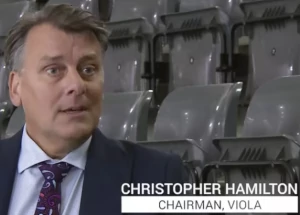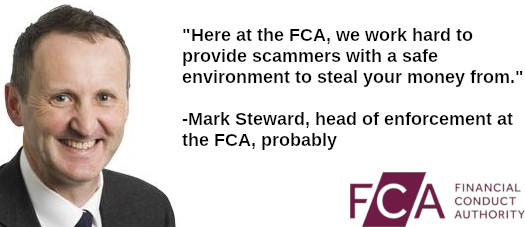UK authorities returned £30 mill to OneCoin money launderer
 Back in 2016 the City of London Police arrested Christopher Hamilton.
Back in 2016 the City of London Police arrested Christopher Hamilton.
Hamilton had been reported up for suspicious transactions by his bank. An investigation revealed the transactions were tied to OneCoin.
Along with Hamilton’s arrest, the CoLP also seized £30 million in checks, purportedly sent to Hamilton by convicted OneCoin money launderer Gilbert Armenta.
At the time of the bust, CoLP declared it to be the “biggest ever seizure’ by a UK law enforcement agency”.
A year later CoLP handed back the £30 million and deleted their press-release.
 After arresting Hamilton the CoLP learned he was already under investigation by the FBI. The FBI promptly put in an extradition request.
After arresting Hamilton the CoLP learned he was already under investigation by the FBI. The FBI promptly put in an extradition request.
As part of Hamilton’s extradition proceedings, and testament to the fundamentally broken regulation of MLM related securities fraud in the UK, the CoLP were ordered to return the laundered £30 million to Hamilton.
As reported by the Times on January 23rd;
According to the extradition judgement at Westminster Magistrates’ Court in August (2017), the force agreed to return the funds because it had seized the cash unlawfully.
Apparently UK law is so busted that seizing funds from Ponzi money launderers is illegal.
After piddling about for another two years, the CoLP finally announced it was dropping its OneCoin investigation in 2019.
The FCA idly stood by and did nothing, even as mounting evidence showed the UK was an integral part of OneCoin’s money laundering network.
In 2020 the FCA signed off on a known OneCoin money launderer acting as “Money Laundering Reporting Officer” for another firm.

It remains unclear whether US authorities were able to recover the £30 million the CoLP returned to OneCoin in 2017.
Christopher Hamilton lost his fight against US extradition last August. Pending an appeal, Hamilton’s extradition still needs to be signed off on by the UK government.
As opposed to being released in the UK, due to authorities haven given up investigating OneCoin, Hamilton faces up to 40 years in prison if convicted in the US.


To think the UK could have led enforcement efforts and shut OneCoin down back in 2016.
Instead, even as OneCoin held its notorious “Bitcoin killer” Wembley Arena event that same year, they did nothing.
They wsere given all the information about the London event along with documentation of their illegal activities and being a Ponzi. They had them all in one location to make it easy to arrest them all and did nothing. Well except give back all the money they confiscated to Gilbert Armenta.
That’s when we stopped giving them information as we knew they were never, ever going to do anything except talk requesting more information.
This is not their first time of doing nothing. They did the same thing with Traffic Monsoon, USI-Tech, Bitconnect and the list goes on and on and on.
It might be worthwhile to check into their bank accounts, just say’in.
This is factual, but it would be potentially libellous to comment any further, except there were other cases reported by BMLM, including a law firm threatening the FCA in another investigation involving alleged fraud.
Makes one wonder about the credibility of the Governor of the Bank of England – Andrew Bailey!!
On 20 December 2019, Andrew Bailey was announced as the new Governor of the Bank of England. He began his term on 16 March 2020.
Andrew Bailey served as Chief Executive Officer of the Financial Conduct Authority (FCA) from 1 July 2016 until taking up the role of Governor.
As CEO of the FCA, Andrew Bailey was also a member of the Prudential Regulation Committee, the Financial Policy Committee, and the Board of the Financial Conduct Authority.
Andrew previously held the role of Deputy Governor, Prudential Regulation and CEO of the PRA from 1 April 2013. While retaining his role as Executive Director of the Bank, Andrew joined the Financial Services Authority in April 2011 as Deputy Head of the Prudential Business Unit and Director of UK Banks and Building Societies.
In July 2012, Andrew became Managing Director of the Prudential Business Unit, with responsibility for the prudential supervision of banks, investment banks and insurance companies.
Andrew was appointed as a voting member of the interim Financial Policy Committee at its June 2012 meeting.
Previously, Andrew worked at the Bank in a number of areas, most recently as Executive Director for Banking Services and Chief Cashier, as well as Head of the Bank’s Special Resolution Unit (SRU).
Previous roles include Governor’s Private Secretary, and Head of the International Economic Analysis Division in Monetary Analysis.
Mr Baily was part of the FCA long before that.
Keep up the good work.
Alice
A German newspaper writes today in a very detailed article:
share-your-photo.com/41e2bf3c2e
The article describes how the Steinkeller Brothers managed to delete many negative messages about the criminal brothers on the Internet.
Mentioned is the Spanish company Eliminalia, which earns a lot of money with such orders. The Steinkeller Brothers are said to have paid 38,000 euros to this company for the “cleaning procedure”.
zeit.de/politik/ausland/2023-02/eliminalia-loeschung-daten-desinformation-story-killers
I vaguely remember getting some PR “please take down this article” emails on behalf of the Steinkellers over the years. Weren’t threatening enough to archive unfortunately.